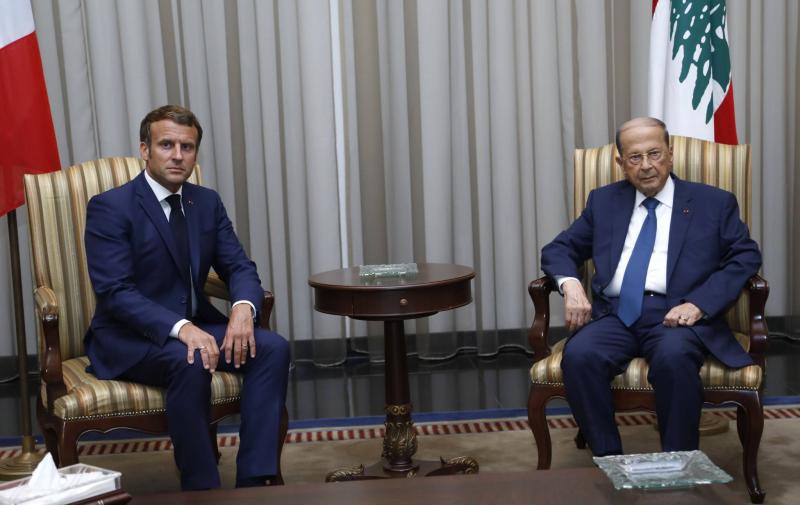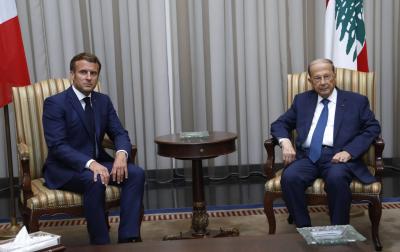Tony Issa wrote today in the newspaper Al-Joumhouria:
It is likely that the French initiative has reached a fateful crossroads: either it will succeed, or its owner, President Emmanuel Macron, will deal it a fatal blow. The first criterion is: are there chances for President Saad Hariri to form "Macron's government" or not? For Macron, his battle in the Middle East and the Mediterranean basin, including Lebanon, is also a battle for his political existence in France. He fights to achieve external victories to bolster his internal support, while his international opponents bet on weakening him in the upcoming presidential elections.
The fiercest confrontation was with former U.S. President Donald Trump, who often mocked him for being weak in terms of public support and took pleasure in the "yellow vests" phenomenon that troubled Macron for a long time. In June 2019, during the commemoration of the D-Day landings in World War II, Macron launched the idea of creating a unified European army to defend the continent, to which Trump responded mockingly while highlighting the costs borne by Americans in defense of Europe.
Moreover, Trump imposed tariffs on essential European imports, withdrew from the Paris climate agreement, froze support for the World Health Organization, and exited the nuclear deal with Iran, contrary to the Europeans. Trump also encouraged Britain to leave the European Union and allowed Turkey under Erdogan to challenge France in the Mediterranean, Armenia, Greece, and Cyprus. He continued to provide moral support for far-right leaders in Europe, including Hungarian Prime Minister Viktor Orban and Marine Le Pen, the leader of France's National Rally.
The "fate," that is, the date of the American elections, helped Macron succeed in his gamble and wait until the defeat of the right in the White House and the arrival of Joe Biden, who is closer to European thinking. Today, he bets on building a fruitful phase of cooperation with the Americans on international issues.
However, the nature of the game remains the same: while Macron won the battle against Trump, now it's his turn. He is preparing for a presidential battle with uncertain results in the spring of 2022. Trump has gone, but he left Macron to face a fierce battle with his ally, the French far-right. Notably, Finance Minister Bruno Le Maire recently warned that Le Pen winning the presidential elections is a "real possibility."
Statistics from recent polls show that Macron may defeat Le Pen in the contest, but it would be difficult. She garnered 48% of the polled votes, a concerning figure for the French president, especially since his competitor only achieved 30% in the 2017 presidential battle. Macron needs to secure five more years in the Élysée to realize the goals outlined for his current term. Therefore, in his final year, he needs quick and strong victories abroad, especially in the vital area for France, the Euro-Mediterranean, which would give him a strong standing in French public opinion.
The positive aspect is that Biden has taken quick steps to mend the rifts with the Europeans, particularly France, by returning to the climate agreement and the World Health Organization and exerting pressure on the Turkish government while opening channels for cooperation with Europe on several issues, including the Middle East and Iran.
However, this time, Macron is the one pressed by time regarding Biden, who has just started his term, unlike Trump, who was cornered in the last months and weeks of his presidency. Ironically, most countries involved in the Middle East are waiting for changes in the coming months or at most within the next year.
In Israel, Benjamin Netanyahu is likely to remain after the upcoming elections next month, while in Tehran, the West may be hoping for a change in presidency next June that could lead to a change in approach. However, preparations are underway for a battle between hardline candidates, with the decision likely remaining in the hands of Supreme Leader Ali Khamenei.
Among the files that Macron is eager to achieve breakthroughs in is the Lebanese file, due to its impact on his image in French domestic politics. After Biden's arrival, Macron tried to push his proposals in Lebanon, believing that the Americans would "look the other way," and encouraged President Saad Hariri to secure domestic and Arab backing for that.
However, Macron quickly discovered that this attempt was futile. While it is true that the Americans will be the number one player in leading the Lebanese dossier and will give the French a certain share, it is also true that it is impossible for the French to succeed in Lebanon without the Americans. Thus, Hariri came from the Élysée meeting and once again proposed the "government of independents," which was part of Macron’s initial initiative and was acceptable to Washington, but rejected by the Iranians. Aoun's position serves Iran's desire to prevent the country from being handed over to the "initiative government." Likely, the "collision" between Macron and Aoun will intensify.
The paradox is that both men are preparing to enter the last year of their term: Aoun in the fall of 2022 and Macron the spring of 2022. However, that spring in Lebanon coincides with an (hypothetical) date for parliamentary elections, which may be postponed until after the fall to allow this council to elect a new president... or extend Aoun's term... or do anything else.
The phase is filled with bets on waiting. But who will say "ouch" first? And who will exit the stage before the other: Macron, Aoun, or someone else?




